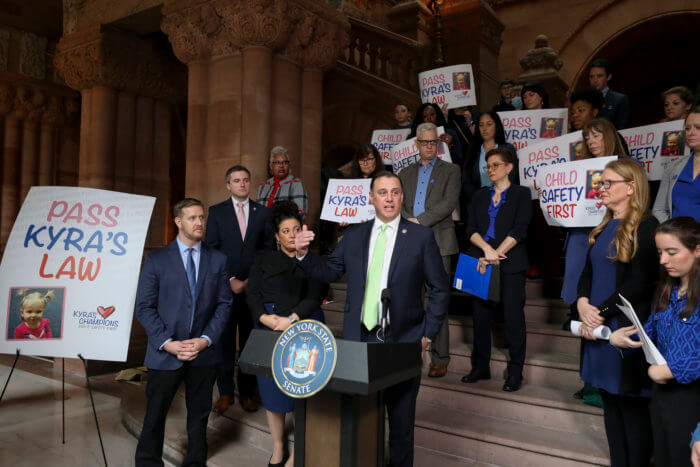The full New York State Senate firmly rejected Governor Kathy Hochul’s nomination of Hector LaSalle to be Chief Judge of the Court of Appeals on Wednesday, after Senate Democrats hastily brought a vote to the full floor intended to moot a pending lawsuit filed by the chamber’s Republicans.
After all was said and done, the Senate rejected LaSalle’s nomination by a vote of 39-20, mostly along party lines with Hochul’s own Democratic Party opposing and Republicans in support. That should firmly put to rest the nomination saga, resulting in a substantial political defeat for the newly-elected governor.
In a statement, the governor decried the Senate’s rejection but finally admitted that the nomination was defeated, and pledged to soon advance a new nominee.
“This vote is an important victory for the Constitution. But it was not a vote on the merits of Justice LaSalle, who is an overwhelmingly qualified and talented jurist,” Hochul said. “Now that the full Senate has taken a vote, I will work toward making a new nomination. I remain committed to selecting a qualified candidate to lead the court and deliver justice. That is what New Yorkers deserve.”
Hochul nominated LaSalle for the position of Chief Judge — who presides over not just New York’s top court, but the state’s entire sprawling court system — in December, but the nomination quickly proved controversial among progressive groups, unions, and Democratic lawmakers over past decisions of his on topics like abortion, labor, and the rights of criminal defendants.
“Is this the person we want setting precedents that will alter the course of New York’s history and law for years to come,” asked Manhattan Democrat Brad Hoylman-Sigal, the Judiciary Committee chair, on the Senate floor Wednesday, just before the floor vote. “I can’t say with confidence that that’s the case.”

Looming over Democrats’ unease with LaSalle was his would-be predecessor, Janet DiFiore, who retired last summer after a tenure widely seen as lurching the court in a conservative direction. DiFiore had been confirmed in 2016 with little resistance, but Democrats hoped to apply more scrutiny to her successor, especially in light of the even-further lurch to the right of the United States Supreme Court.
LaSalle, who would have been the state’s first Latino Chief Judge, certainly didn’t impress in a five-hour Judiciary Committee hearing and was voted down by committee members, who thought that settled the matter. But Hochul then threatened to sue the Senate to force a full floor vote, contending the state constitution allows only the full Senate, not a committee, to reject a gubernatorial nominee. Never before had a governor’s nominee for Chief Judge been rejected by the committee.
Ultimately, though, it wasn’t Hochul who sued, but the Judiciary Committee’s top Republican, Anthony Palumbo of Long Island, advancing the exact same argument previously floated by the governor. So on Wednesday, the Democratic majority opted to moot the GOP’s suit by advancing the nomination to the floor, hoping to once-and-for-all settle the nomination — deemed a “distraction” — and get back to business as usual.
“We have a state to run,” said Senate Majority Leader Andrea Stewart-Cousins in a statement before the vote. “The 2023-24 $227 billion budget is due in six weeks. Our highest court has no appointed Chief Judge, and we need the court system to function. This court case, if allowed to continue, would’ve dragged on for months and stymied our judicial system. It’s time to put this matter to rest.”
And so, with a few hours notice, the Judiciary Committee met to advance the nomination and quickly arranged a floor vote, where it quickly became clear that the Democratic governor’s nominee would almost exclusively be advanced by the GOP, even though all Republicans on the committee had voted “no recommendation” rather than yes last month.
Palumbo, speaking on the Senate floor before the vote, characterized LaSalle as a jurist of integrity who “simply calls balls and strikes” rather than applying a political ideology to rulings. He also accused Democrats of running roughshod on the state Constitution, and seeking to avoid a judicial ruling that would not only force a vote on LaSalle, but potentially set precedent on the Senate’s advice-and-consent procedures.

“The Chief Judge of the highest court in a state of 20 million people is not a distraction to me, and neither is the Constitution,” said Palumbo. “So I’m glad to see that at least this nominee gets to come to the floor, because that’s what the constitution dictates. The Senate body can make its rules, absolutely, but they need to do it within constitutional parameters. The Constitution wins over all.”
But Democrats, who have dismissed the GOP’s legal arguments, contended that they were simply fulfilling their role as a coequal branch of government. Hoylman-Sigal said that the increased scrutiny on LaSalle compared to prior nominees was the genesis of a new era in Albany, where executive branch decisions are closely probed rather than rubber-stamped.
“This is a new beginning for the way we review judicial nominations, all nominations, legislation, all matters of public import. I think that’s something we should be proud of,” said Hoylman-Sigal. “We are disrupting the status quo because, in fact, we know the nominee was a member of our own party. We know the nominee was selected by a member of our own party. You should be happy that we are in fact looking under the hood and examining a nominee’s record to the extent that we have.”
Citing the importance of the Court of Appeals to everyday New Yorkers, Hoylman-Sigal opined that the Senate shouldn’t settle for a nominee but actually try to find the best person for the job, a descriptor they don’t see as befitting LaSalle.
“We can find a better nominee to lead this court, and we need to do it ASAP,” he said, citing in particular a massive 81,000-case backlog in New York City’s Family Court.
In the end, with LaSalle watching despondently from the rafters, the vote went about as anyone would’ve expected. 39 senators, mostly Democrats, voted against the nomination and 20 mostly Republican senators voted for it; one Democrat, Monica Martinez, of Long Island, voted in favor, and one Republican, Maria Mattera of Long Island, joined the nays.
Notably absent were the two Judiciary Committee Democrats who had initially voted to advance his nomination: Kevin Thomas of Long Island and Luis Sepulveda of the Bronx.
Palumbo, in his remarks, said that he didn’t suspect the floor vote would moot the entire case, and that he would be in Suffolk County Supreme Court on Friday for scheduled oral arguments. A spokesperson for the state’s court system told amNewYork Metro confirmed that the hearing will still take place.
For now, the position atop New York’s judicial branch will continue to be filled by Acting Chief Judge Anthony Cannataro.






































